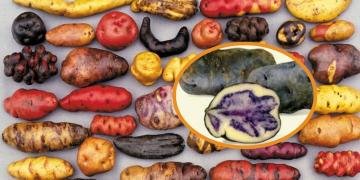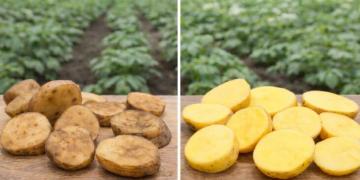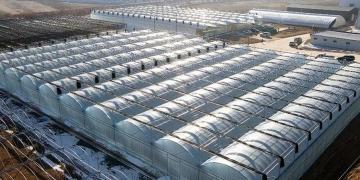News: Goodbye cotton, potato yarn is going to revolutionize the fashion world
A British startup has invented a new, more eco-friendly, economical, and sustainable textile fiber based on the noble potato.
The fashion industry is often criticized for its significant environmental impact. High water and energy consumption in its production processes, resource depletion, chemical pollution, and the waste-generating fast fashion culture are all taking their toll on climate change.
Amidst this situation, the British startup Fibe has developed a surprising alternative: potato yarn. It’s a textile fiber made from potato stem waste, an eco-friendly alternative that could replace up to 70% of global cotton demand, the company says.
A widely consumed food
The potato is one of the most widely produced foods in the world, with millions of tons harvested each year. However, only the edible tuber is used; the stems and leaves are discarded. These plant remains are pulverized or incinerated, generating waste with no economic or ecological value.
There’s no doubt that potato floss production represents a major breakthrough, as it reduces water consumption by 99.7% and carbon emissions by 82% compared to cotton. Furthermore, it doesn’t require any additional land beyond that used for tuber cultivation.
How are fibers extracted and treated?
Fibe uses a revolutionary biological process to extract fiber from potato stems. After harvesting, the stems are broken down using natural enzymes that release the fibers from the plant material.
These fibers are then refined and integrated into the existing cotton spinning infrastructure. This system doesn’t use toxic chemicals, making it more environmentally friendly. It’s also more cost-effective because it utilizes an abundant and inexpensive raw material.
The resulting material, potato yarn, has mechanical properties similar to those of cotton, but is softer, stronger, and more durable than linen or hemp. Its versatility allows Fibe fibers to have a variety of applications, from T-shirts to bedding to canvas.
Challenges
Despite the potential presented by Fibe, the path to large-scale production still entails several challenges. One of them is lowering the costs of the biotechnological process to make it viable on an industrial scale.
In addition, the company is working on automating potato waste collection and identifying potato tuber varieties that produce the most fiber. The company’s plans for 2026 include building a pilot production plant and beginning commercial implementation of its material.
The impact of cotton
Potato yarn is presented as a good alternative to cotton, one of the most widely used textiles in the world, but with a huge environmental impact. Cotton accounts for 2.5% of all farmland and requires a huge amount of water; a single T-shirt made of this material requires more than 2,700 liters of water. Furthermore, it contributes to deforestation and soil degradation due to the intensive use of fertile land.
A before and after
Thus, the potential of this tuber could mark a turning point in the textile footprint of an industry that has traditionally relied on raw materials such as cotton and polyester.
By utilizing agricultural waste, it reduces environmental impact, promotes the circular economy, supports more sustainable practices, and represents a new market option for farmers.
For all these reasons, potato yarn represents a strong commitment by the British startup Fibe, which could unleash an incredible revolution in the world of sustainable fashion.
Fuente: noticiasdegipuzkoa.eus





